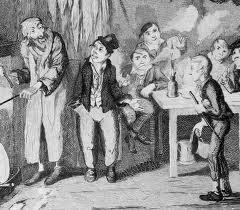I am supposed to be on vacation. I am supposed to be humming along contentedly with the guy singing “Boat Drinks” poolside and fending off my children’s demands for junk food. Actually I am doing both of those things. It’s just that I am doing them while furtively typing on my iPad. Furtively because my husband disapproves of my working when I am supposed to be “recharging,” whatever that means. I have yet to discover a low battery indicator anywhere on my person.
A review in this Sunday’s NYT Book Review has been bugging me. It was written by one Richard A. Posner, whose vaunted status in the world of law and economics is only mildly alluded to in a one line bio that says that he is a judge on the Seventh Circuit Court of Appeals. This is a bit like saying that Ayn Rand was a writer; it gives, shall we say, an incomplete picture. But that isn’t what’s been bothering me about the review.
The review, itself entitled “Working 9 to 12,” concerns “How Much is Enough? Money and the Good Life,” by Robert Skidelsky and Edward Skidelsky. Judge Posner opens his review by remarking that Robert Skidelsky is best known for writing a multi-volume biography of John Maynard Keynes, and later, with the faintest trace of snark, suggests that Skidelsky’s views (more on them in a moment) are to be expected given his Keynesian “preoccupation.” (When I read that I was immediately put in mind of Potter Stewart’s declaration of pornography, just a tiny bit sneeringly, that he knows it when he sees it; but it’s possible I’m reading too much into what is, most likely, literary dicta.)
The Skidelskys argue, based on a 1930 essay by Keynes, that because labor costs have decreased so significantly since the First World War, workers in the United States and Britain should be enjoying more of “the good life” and working fewer hours, in the range of twenty hours a week or so. Posner responds – convincingly – that most people would quickly run out of money to fill so much resulting free time, that militaries would struggle to staff the borders, and that essential public services like police and fire departments would be gutted. All of these points make sense and are sufficient, in my mind, to render the Skidelskys’ proposal unworkable. Judge Posner could have left it at that.
But he goes on, and this is where he loses me:
The Skidelskys have an exalted conception of leisure. They say that the true sense of the word is ‘activity without extrinsic end’: ‘The sculptor engrossed in cutting marble, the teacher struggling with a score, a scientist exploring the mysteries of space and time – such people have no other aim than to do what they are doing well.’ That isn’t true. Most of these people are ambitious achievers who seek recognition. And it is ridiculous to think that if people worked just 15 or 20 hours a week, they would use their leisure to cut marble or or struggle with a musical score. If they lacked consumer products and services to fill up their time they would brawl, steal, overeat, drink and sleep late. English aristocrats in their heyday didn’t work, but neither did they cut marble or explore the mysteries of space and time. Hunting, gambling and seduction were their preferred leisure activities.
It’s interesting to me that Judge Posner takes the English aristocracy here as his example, since his thinking is more reminiscent of the French. As in, give the dullards some cake. (Also for what it’s worth, Byron and Raleigh were both English aristocrats.) There is a real strain of snobbery in this line of thinking, which is disappointing, since everything I’ve read by or about Judge Posner suggests that he is in fact the opposite.
I suspect Judge Posner would not include me in the class of folks who would brawl, booze and steal with their free time, but my extended family, maybe. I come from thoroughly blue collar stock. My uncles drank (horrors) National Bohemian and wore cut off jean shorts in the summer. They worked very hard for two local utilities and a candy factory. And no, they would not have taken up sculpting with twenty extra hours a week, but as far as I can tell neither has anyone on the Seventh Circuit.
Two of my uncles died very shortly after they retired, both of cancer, and they had very little time to enjoy the free time they had earned through years of work that included many many hours of overtime. Judge Posner would no doubt respond that they were paid for the time they worked, including a premium for overtime, and that is true. It was the overtime that permitted them to maintain a good standard of living while keeping them too busy to enjoy it much. But I also have no doubt whatsoever that my uncles would not have transformed into thieving hooligans had they lived. Not because they were too old to make trouble, because the history books are full of old men who made trouble, and many of them kings. They wouldn’t have done because they were good people, as are most of the people who make up the working class in this country and elsewhere. And who deserve a little better than to be written off by Judge Posner as Henry Potter’s lazy rabble.
Of course I recognize the irony in the fact that I am posting this from a lounge chair by the pool (about eight pools actually, and a grill and a pool bar nestled amongst palms). You could look at it this way: here I am, a product of Northeast Bawlmer, no less, enjoying my leisure time, and doing nothing much useful other than thinking about economics. Luckily I return to work next week, so the shop keepers and dram shop proprietors of the world need have no fear of me.

